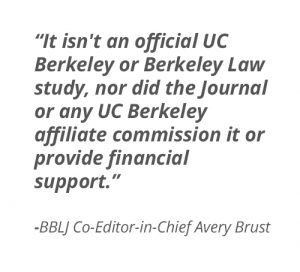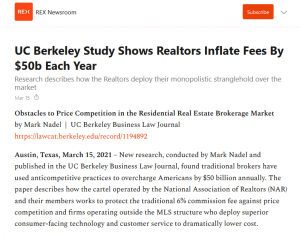UC Berkeley Law Journal Says Commissioned Article Is Not an Official University Study in RISMedia Exclusive Real Estate Investigative Report
The National Association of REALTORS® (NAR) is challenging a commissioned study that compares it and its members to a “cartel.”
“The study in question is based on false premises and not grounded in facts or reality,” said an NAR spokesperson in response to a recently published article in the UC Berkeley Business Law Journal (BBLJ), accusing the NAR and its members of engaging in “anti-competitive practices.”
The report was commissioned by Texas-based Real Estate Exchange (REX), a real estate startup, touting its digital-based business model designed to reduce brokerage commissions, among other personalized services, for clients. Co-founded in 2015 by CEO Jack Ryan, the REX platform uses AI and machine-learning technology to replace the conventional real estate model and market homes directly to buyers.
“The residential real estate industry is structured to require peer cooperation to complete transactions,” wrote author Mark Nadel in the article. “Thus, innovative entrants offering to compete on price have been stymied by traditional real estate brokers acting as an informal cartel.”
 Nadel, an attorney and policy advisor for the Federal Communications Commission (FCC), said he authored the article independently of his employer.
Nadel, an attorney and policy advisor for the Federal Communications Commission (FCC), said he authored the article independently of his employer.
According to a footnote in his article, Nadel thanked REX for “financially supporting this update and refocus of arguments for reform made in an earlier article.”
The report featured in UC Berkeley’s publication was an updated version of a previously published article that Nadel wrote in 2007. In an exclusive interview with RISMedia, Nadel said REX paid him to update his 14-year-old report for republication.
“They told me that they were looking for a paper to share with think tanks to point out the dysfunction—that’s not the best word—the anti-competitiveness of the current industry structure,” Nadel said. “That was their view, and they were looking for some people who had written about this, and they found me, and I think that on many issues, we agree.”
‘Anti-Competitive’ Claims
Nadel’s study alleged that “traditional agents” are fleecing clients for billions while also stymieing “new and non-traditional entrants.”
According to an email response from Nadel, “I use traditional brokers/agents to describe those who want to maintain the current system—where price competition is minimal—and total commissions are high. Non-traditional brokers/agents are those who want to try different options, especially significantly lower fees, a la carte pricing, or anything that could lead to increased price competition.”
Nadel wrote that “traditional agents” often steer buyers toward or away from particular listings to find better co-op fees, adding that traditional agents are reluctant to do business with non-traditional agents.
“After all, their very existence threatens to collapse the informal cartel that protects the inflated fees of traditional brokers,” he wrote.
The article also claimed that traditional listing brokers “generally avoid disclosing or discussing their prices, and they maintain the anti-competitive practice of setting co-op fees, the fees they offer to buyers’ agents.”
Not a UC Berkeley Study
REX cited Nadel’s study in a recent press release targeting the NAR and its members.
“Nadel’s research describes how the National Association of REALTORS® (NAR) and their members use their monopolistic stranglehold over the market, such as restrictive ‘all or nothing’ membership rules and commission tying practices,” read the press release that called Nadel’s work a “new UC Berkeley study,” in its title.
However, the report isn’t a university-backed study, according to a Berkeley Business Law Journal editor.
“It isn’t an official UC Berkeley or Berkeley Law study, nor did the Journal or any UC Berkeley affiliate commission it or provide financial support,” said BBLJ Co-Editor-in-Chief Avery Brust in an email to RISMedia.
“Our Submissions Team reviews hundreds of articles annually, all submitted by external parties. We extend publication offers to a small subset, including Mr. Nadel’s,” said Brust. “We then work with the authors to make edits for structure, clarity and formatting in preparation for publication.”
REX declined to comment on the wording of their press release’s title.
 Nadel also confirmed that UC Berkeley played no financial role in his work.
Nadel also confirmed that UC Berkeley played no financial role in his work.
“REX was the impetus of the revision because they paid me to do it,” Nadel said. “Would I have done it if they didn’t pay me? No.”
Nadel claimed that he maintained editorial control of the piece while the real estate startup offered feedback on his outline.
“Yes, they gave me feedback—a couple of people—on draft,” he said. “I don’t think Jack Ryan [CEO and co-founder of REX] looked at it. I wanted to get his feedback. I sent it to NAR, and I sent it to a couple of other people who commented on my earlier piece, and I would’ve sent it to anyone else who had the time to look through it.”
“This important research shows that real estate fees should be tied to valuable service, yet according to the National Association of REALTORS®, most consumers already do the work themselves,” said Ryan in the press release.
REX made a similar point in its recently filed antitrust lawsuit against the NAR, Zillow, and Trulia, alleging that the online real estate marketplaces gave preferential treatment to NAR broker listings.
“If the NAR and its MLS partners, which now include Zillow, are allowed to once again close off transparent access to home inventory by entering into agreements among themselves that disadvantage all but their own membership, consumers and competition will suffer,” read the March 9 lawsuit filing.
The Rebuttal
The NAR lambasted the article’s claims and rebuked REX.
“REX is trying to take the benefits of the MLS system without contributing to it,” said an NAR spokesperson.
A statement from the organization went on to say that the MLS welcomes all brokers.
“In fact, because of MLSs, we’re at a point in the market where we’re seeing unprecedented benefits to consumers and competition among brokers, especially when it comes to service and commission options,” NAR said. “All this gives consumers many different choices, including which customer service approach, which broker, and which commission model they prefer.”
“The cooperative broker MLS system levels the playing field, allowing smaller brokerages to compete with larger ones,” NAR continued. “Within seconds of logging into an MLS, you have instant exposure and access to the largest, centralized database of residential real estate listings. By having all properties listed in one location, even the smallest of brokers have access to the same listings, information, and pool of buyer brokers as the largest brokers,”
According to NAR, the MLS system incentivizes cooperation between brokers who share all their information in one place, providing the best and greatest number of options for buyers as efficiently and transparently as possible.
“In turn, sellers get access to the largest possible pool of buyers within a market because their listing broker will cooperate with all the buyers’ brokers to achieve the best offer,” said the NAR spokesperson.
The organization also noted that brokers on both sides of the transaction could negotiate commission amounts, as can sellers.
Contrary to Nadel’s study, NAR said homebuyers are more informed about what they want in a home and market availability due largely to portals that use MLS information.
“The reality is that brokers who were only to show homes that offer high commissions wouldn’t be in business very long, as buyers would demand to see other options or go to someone else who will show them those properties,” said NAR, adding that brokers have an ethical duty to show those homes in addition to others the broker considers to be a fit for a buyers’ priorities.
According to NAR, the largest MLS in the country reported this year that only 1.5% of the more than 250,000 searches in the system included commission in the criteria.
“NAR is currently in the process of adopting rules that explicitly prohibit such searches entirely, further ensuring the MLS system continues to create highly competitive markets with increased transaction volume and superior customer service,” read the NAR statement.

NAR President Charlie Oppler
NAR President Charlie Oppler also issued a recent statement to “address misinformation being circulated by certain parties.”
“Class action attorneys looking for a payout and those illegitimately trying to position themselves in the real estate market are trying to mislead people with misinformation and glaring omissions about the real estate agent commission structure,” Oppler said, noting that the current commission structure helps put homeownership within reach for homebuyers across several demographics.
He issued this warning to the industry and its consumers.
“Beware of the alternative reality being advanced by big money plaintiff’s attorneys looking for a payout and those illegitimately trying to position themselves in the real estate market,” Oppler said. “What’s real are the everyday real estate agents living and serving in our communities across the country who are helping their fellow, everyday Americans achieve the ultimate American dream.”
Read Oppler’s full statement here.
Stay tuned to RISMedia for further developments.
Jordan Grice is RISMedia’s associate content editor. Email him your real estate news ideas at jgrice@rismedia.com.





Just another lazy one that jack ryan is.Wants to sit behind a computer and get rich ?? I bet this hypocrite didn’t buy his house online !!!
Shawn Modzelewski
586 337-0123
All inventory in the U.S. should be available to any licensee, Realtor or not. MLS should be privately owned. Realtor boards would then be forced to give you something for your dues besides MLS. We would all make more money and our clients would benefit. As a 40 year Realtor, licensed in 2 states – 1 Board where MLS is private and 1 Board where MLS is Realtor required, I speak from experience. The area where the MLS is private is less costly to me with more bene’s from my Assn and the Clients feel no ‘restriction of trade’ issues.
The claims by REX and others are grossly inaccurate and COMPLETELY false. NAR and the MLS systems have always encouraged fair competition and behaviors that don’t violate the anti-trust laws.
The MLS systems in use today were developed over time to create a platform where REALTOR members could share information, cooperate with one another (as “competing” members), and better serve the public.
Prior to the formation of NAR’s predecessor in 1908, the National Association of Real Estate Exchanges, there was no such thing as an MLS nor was there any cooperation between brokers. Information was fragmented. Each competing broker looked out only for their own interests.
The NAR and MLS were established to changed the way business was done in the industry. For an example of how this used to look, one just has to look at the commercial brokerage industry which has maintained many of the traditional practices.
The commercial brokerage industry doesn’t have an MLS nor are many CRE brokers/agents REALTORS or members of NAR. Therefore, there isn’t a collective Code of Ethics and Standards of Practice to which they adhere, and there isn’t a unified stance on broker cooperation and compensation.
For the most part, each CRE firm operates independently and conducts business strictly as competitors. And not as “cooperating competitors” as practiced among REALTOR members through use of the MLS.
Broker cooperation and compensation in the CRE industry is on a case-by-case basis. And the onus of professional ethics is left up to each firm to decide what that is.
(I’m not criticizing the CRE industry either, I’m just referencing it as an example to display how things used to be done before the creation of the NAR and MLS).
Finally, the NAR, REALTOR boards, and associations provide SO MANY practice management tools, courses, resources, information, and benefits to facilitate the success of its members’ privately owned small businesses.
Especially when compared to other professional industries with independent contractors such as law, consulting, architecture, medicine, and finance.
The MLS system has it’s problems, no doubt. The rules change from one MLS to the other. Access to all listings is limited from some MLS’s to another. The biggest problem I see is the MLS’s sell the listing access to the likes of online real estate entities that then use our hard work and listings to sell us back advertising on the very listings we worked hard to get. Some of those entities are now trying to create their own sales groups using our listings to validate their credibility. All wrong in my book. If we worked to get a listing then all online entities should post that information first on any website and make consumers aware of who the listing agent is in fact.
Buying a home is as close to practicing law as you can get, and Realtors are as close to lawyers as any other profession. We are constantly under pressure to learn and use new forms that are real estate law. It is a profession based on skill and understanding of the law related to property. Unfortunately the study does not address the experience needed, and indicates anyone can complete the forms for any kind of a fee. Attys charge for their expertise in their area, Realtors are also highly skilled professionals, the industry has been bombarded by cheaper alternative order takers who want to enter our market for flat fees to fill out the forms. It’s not the same, professionals earn a fee for their years of experience that they bring to buyers and sellers. If buying or selling real estate was just like buying or selling an object like a car or trailer that you can take anywhere then some of his points could be heard. He is more noise out there that Realtors earn too much. Realtors earn their value by what they bring to the table. Cheap service is always the same, it’s order taking. Professionals sort through the issues and should command a value for their services. Best advice on that report is to hit delete. It’s not worth the acknowledgement.